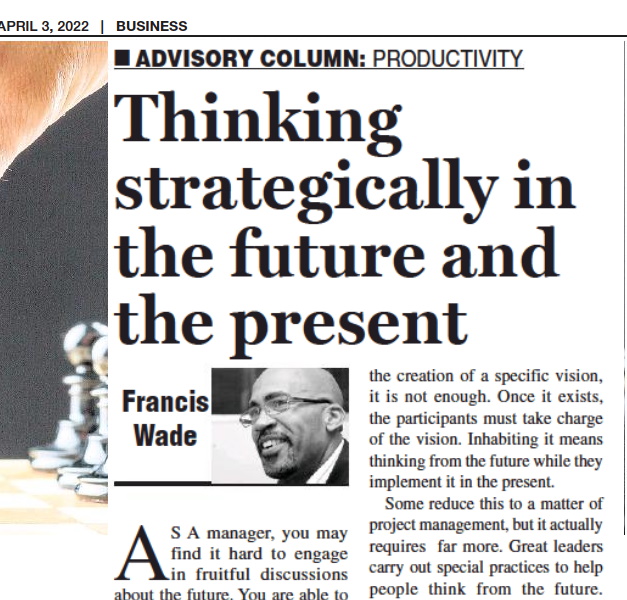As a manager, you may find it hard to engage in fruitful discussions about the future. You are able to speculate informally over lunch, but be unable to plan strategically in a formal session. You sense that this needs to change, but how? Where will this new skill-set come from?
Few things are more distressing in organizational life than a manager who was good at his old job, but still tries to perform it after being promoted. While he was elevated based on his technical ability, these are of little use now that employees report to him. They expect something new: leadership.
The same applies to the executive suite, and in particular the role of a CEO. More specifically, newly minted executives often don’t think strategically. The truth is, they gained their reputations based on reaching short-term results and fighting fires.
While every company needs middle-level managers who can demonstrate these skills, as leaders they are entrusted with something different: the company’s future.
If they are lucky, mentors take them under their wings, and deliberately stretch their capabilities with well-designed assignments and training. But this is rare. In general, a new executive’s lack of strategic planning skills isn’t revealed until the situation desperately needs them. By then, it’s too late. Instead, here are three competencies you can proactively develop.
- Thinking *about* the Future
I have met many CEOs and MDs who don’t talk about specific future outcomes at all. In their minds, all they need to do is react to stuff that might happen.
However, the best leaders don’t sit back: they create the future. For example, Facebook has a 15-year plan for the Metaverse which is intended to shape the way the internet is used globally.
By so doing, they confront the natural inertia of the vast majority who prefer to stay in their comfort zones.
As an executive, your job is to coach top managers to think about the future as a malleable object. They can become visionary. But you may need to do some convincing. In other words, you must educate, challenge and confront. And demote the unwilling or unable.
The fact is that as a member of the leadership team, you should develop the best long-term planning skills, and encourage others to follow your path.
- Thinking *from* the Future
While a good facilitator can drag any executive team through the creation of a specific vision, it’s not enough. Once it exists, the participants must take charge of the vision. Inhabiting it means thinking from the future, while they implement it in the present.
Some reduce this to a matter of project management, but it actually requires far more. Great leaders carry out special practices to help people think from the future. Examples include regular strategy updates using current information.
They also have a knack for bringing up the vision in everyday conversation. Each time, they create the specific future as the context behind every decision. By recalling its importance to stakeholders, they bring the future closer one step at a time.
Finally, they help staff see that Big Hairy Audacious Goals (BHAGs) must be translated into projects, then tasks. This connection is easily lost. Why? Daily emergencies hijack people’s attention, along with the distractions of social media/Netflix. To keep people on track, you should repeatedly bring the vision alive.
- Speaking from the Future
Unfortunately, very few executives know how to inspire others on demand. Call it a recurring failure of organizational life: the few who are inspiring often leave to start their own companies. Those who remain learn to survive the corporate grind by keeping out of trouble, rather than leading.
If this fits your story, you may be annoyed. Now that you have been promoted, you are asked to inspire staff. But where would you have learned to do so?
If the workplace doesn’t offer them, seek out other opportunities. Volunteer in your service organization, church or alumni association. Allow the discomfort of vision-filled speaking to become the norm. Experience the thrill of filling others with the hope of accomplishing remarkable things by working together.
In these challenging times with a pandemic, recession, and war ever-present, the natural human tendency is to withdraw and see performance fall. Great leaders realize this and put themselves at risk. This is your avenue to accomplish the extraordinary.
Start by telling the truth. If, as a CEO or MD, you have never been trained in this dimension, some honesty will help. Embrace this fact, and propel yourself forward with experiments which take you outside your comfort zone. Use the results to learn what works and become someone who can connect the future with the present. Your people are waiting.
Francis Wade is the author of Perfect Time-Based Productivity, a keynote speaker and a management consultant. To search his prior columns on productivity, strategy, engagement and business processes, send email to columns@fwconsulting.com.

